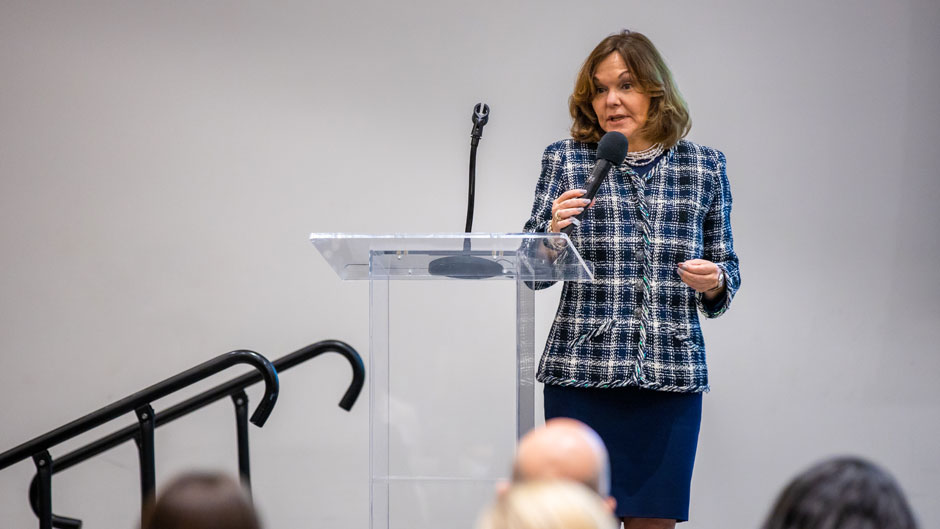Where are the girls?
That was the question one of Felicia Knaul’s thesis advisors posed to her back in the early 1990s, when the then-Harvard University doctoral student was conducting research on street children in Bogota, Colombia.
It didn’t take long for Knaul to respond. She knew the answer immediately, telling her advisor that up to 90 percent of the street children in Latin America were boys. The girls, she explained, were suffering a far worse plight.
“They were trafficked into sexual exploitation. They were trafficked into domestic servitude. They were trafficked into forced labor. They were simply missing from sight, and no one was attending to their needs,” Knaul, now director of the University of Miami Institute for Advanced Study of the Americas, said Tuesday on the opening day of the National Human Trafficking Prosecution Summit on the University of Miami campus.
Presented by the Association of Prosecuting Attorneys in partnership with the Miami-Dade State Attorney’s Office and the University, day one of the two-day conference, which drew dozens of attorneys, law enforcement officers, and victim advocates, addressed solutions to an illicit industry that is second only to the drug trade in profitability, generating an estimated $150.2 billion in illegal profits each year.
But prosecuting attorneys, said Hilarie Bass, chair of the University’s Board of Trustees and a School of Law alumna who served as president of the American Bar Association, have the ability to wipe out human trafficking.
“The one thing I learned among many in that job [as president of the ABA] was the power of prosecutors,” she said. “You have the ability to identify social problems and focus on helping your local communities address them. You probably more than anyone else in your local communities have that power.”
Calling human trafficking a global pandemic, Knaul noted that the International Labour Organization estimates that there are more than 40 million people in modern slavery at any given time, with more than 20 million in forced labor—many of them young women and children who suffer unthinkable acts of violence.
“Violence against women and young people is persistent and pervasive,” said Knaul, who is also a professor of public health sciences at the Miller School of Medicine. “Few if any health condition or risk factor affects so many segments of the global population, especially people living in poverty and in volatile situations including forced migration and humanitarian emergencies.”
About 1 in 3 women experience some form of sexual violence during their lifetimes, leaving them scarred and at-risk for a number of health conditions, Knaul said. And the costs of gender-based violence are astounding, amounting to more than 3.5 percent of global GDP. “That’s double what many governments in our region of Latin America invest in educating their populations,” Knaul said.
Through a new commission on gender-based violence and maltreatment of young people chaired by Knaul and backed by the journal Lancet, “we have a tremendous opportunity for change,” she said at the summit.
Saying “the urgency of addressing human trafficking could not be more pronounced,” President Julio Frenk also noted other University efforts aimed at addressing human trafficking, most notably the Miller School’s THRIVE (Trafficking Healthcare Resources and Intra-Disciplinary Victim Services and Education) clinic, a one-stop shop for victims and survivors that provides everything from primary and gynecological care to psychiatry and behavioral health services.
The U.S. Department of Homeland Security and the Miami-Dade County State Attorney’s Office refer victims to the clinic.
Still, human trafficking presents a daunting challenge that won’t be easy to remedy. Migration, particularly forced migration, is another of its root causes, Knaul said, noting that some 192 million people—about 3 percent of the world’s population—now live outside their place of birth and that up to 1 billion people will be displaced by climate change and forced into migration by 2050, putting even more people at risk of being trafficked.
And Florida, said Knaul, is at the epicenter of “what we’re seeing of the poor searching for better opportunities coming from Central and South America and the Caribbean, where high inequality, poverty and conflict, which mark our region, press, particularly children but also young people and women, into human trafficking.”
The solutions, said Bass, “start here in this room.”
'Cane Talk: A National Model of Healthcare for Survivors of Human Trafficking
Dr. JoNell Potter is the founder and director of the THRIVE Clinic, a Miami health clinic specially designed to meet the needs of survivors of human trafficking, and a professor of obstetrics and gynecology at the University of Miami Miller School of Medicine.

